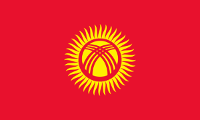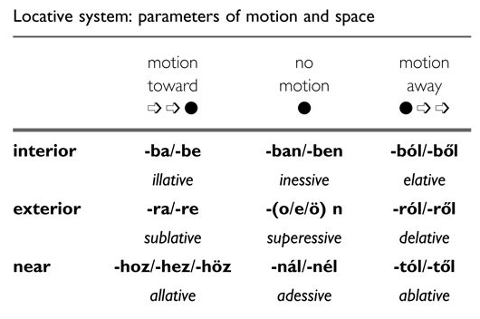Hungarian language: What is your name?
Apparently the question, "What is your name?" in HU comes out, "How do they call you?" That makes perfect sense to me from the Russian point of view. But the answer that I've found so far is, "I am Don." That is, the question and the answer have different grammatical constructions. That weirds me out.
| How do they call you? | Hogy hívják? |
| Don I am. | Don vadjok. |
Hungarian language, hundreds
| 100 | száz (egyszáz) |
| 200 | kettöszáz |
| 300 | háromszáz |
| 400 | négyszáz |
| 500 | ötszáz |
| 600 | hatszáz |
| 700 | hétszáz |
| 800 | nyolcszáz |
| 900 | kilencszáz |
| 1000 | ezer |
Hungarian language, to/from/at
One of the frustrating bits of learning Russian from the English perspective is that there are three sets of prepositions/cases that combine to mean to/from/at. There is a default form. Next there is a set of nouns that must be used with a different set of prepositions/cases; they are not predictable. Essentially you just have to memorize the exceptions. Then there is another set that you use when you are going to see a person, are seeing a person, are coming back from seeing a person. The generalities can be summarized in a table:
| If you go "to" a place using… | then you'll be "at" that place using… | and you'll return "from" that place using… |
| в + acc | в + pre | из + gen |
| на + acc | на + pre | с + gen |
| к + dat | у + gen | от + gen |
It turns out that there is a parallel weirdness in Hungarian. Foreign city names use the ‘interior’ cases. Most Hungarian city names (and cities that used to be part of Hungary) use the ‘exterior’ cases. And if you are talking about the place where a person is (“to the doctor’s,” “at the doctor’s,” “from the doctor’s”), then you use the ‘near’ cases.
(Source of chart: “Hungarian: an essential grammar” by Carol Rounds, 2001)
Here are some sample sentences I generated for practice:
| I arrived in Budapest on Friday. | Megérkeztem Budapestre pénteken. |
| I arrived in Phoenix on Friday. | Megérkeztem Phoenixbe pénteken. |
| I live in Budapest. | Budapesten élek. |
| I live in Phoenix. | Phoenixben élek. |
| I arrived from Budapest on Friday. | Megérkeztem Budapestről pénteken. |
| I arrived from Phoenix on Friday. | Megérkeztem Phoenixből pénteken. |
And here are some more using a person's name instead of a place:
| Where are you? | Hol vagy? |
| I am at Janos's place. | Jánosnál vagyok. |
| Where are you going? | Hova mégy? |
| I am going to Janos's place. | Jánoshoz megyek. |
| Where are you coming from? | Honnan jössz? |
| I am coming from Janos's place. | Jánostól jövök. |
BTW, I'm currently using lang-8.com to double-check my work in HU. On that site you can post sentences for corrections by native speakers. The assumption is that you will do the same thing for others who are testing your native language. I love the attitude behind that idea.
Hungarian language, ‘cost’
Note the use of the illative case.
| How much does it cost? | Mennyibe kerül? |
| It costs two hundred forints. | Kettőszáz forintba kerül. |
Hungarian language, random stuff
- Sweet dreams! Szép álmokat!
- My mother and grandmother always said this to me before bedtime... in English, of course, not Hungarian.
- Kiss/kisses csók/csókok
- This word doesn't sound so great in English; it is pronounced like ‘choke.’
- bogárkám my little bug
- This one made me laugh. It is a general term of endearment.
- csillagom my star
- Another general term of endearment. This one brought to mind the grieving “Ma seule étoile est morte!”


